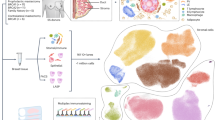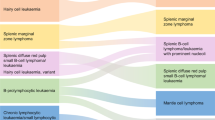Abstract
Chromosomal loss is a characteristic feature of the myelodysplastic syndromes (MDS). A method is described which detects chromosomal 7 loss in MDS by DNA analysis using a specific hypervariable region gene probe which has been cloned from a human DNA fingerprint. Loss of one of the chromosomal 7 homologues was demonstrated in 10/118 MDS patients; the ten patients include all the five patients which had previously been shown to have monosomy 7 by cytogenetic analysis. This technique makes it feasible to study serial samples from large numbers of patients for loss of chromosomal material and could be readily applied to the study of other human malignancies.
This is a preview of subscription content, access via your institution
Access options
Subscribe to this journal
Receive 24 print issues and online access
$259.00 per year
only $10.79 per issue
Buy this article
- Purchase on Springer Link
- Instant access to full article PDF
Prices may be subject to local taxes which are calculated during checkout
Similar content being viewed by others
Author information
Authors and Affiliations
Rights and permissions
About this article
Cite this article
Thein, S., Oscier, D., Jeffreys, A. et al. Detection of chromosomal 7 loss in myelodysplasia using an extremely polymorphic DNA probe. Br J Cancer 57, 131–134 (1988). https://doi.org/10.1038/bjc.1988.27
Issue Date:
DOI: https://doi.org/10.1038/bjc.1988.27
This article is cited by
-
DNA fingerprinting in leukemia
International Journal of Clinical & Laboratory Research (1992)



